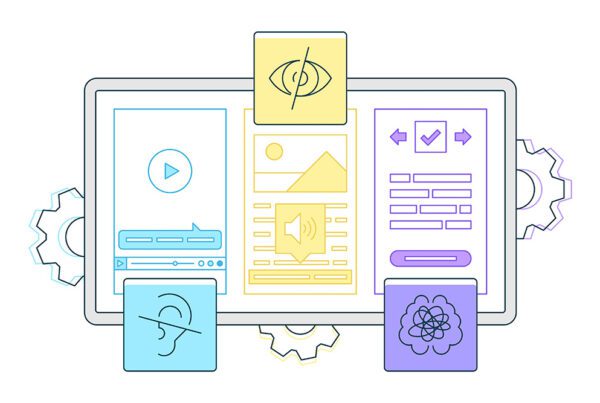If you’re considering investing in a new website, you’ve probably begun envisioning what your new site will look like and how it’ll function. The finished product should look good and represent your business well; and since you’re investing time and money into this project, you don’t want to cut any corners. There was never a doubt in your mind that you wanted a custom website—not a WordPress (WP) site built on a theme.
This situation is one we see all too often. There seems to be a negative connotation associated with WordPress themes, so people assume they want or need a totally custom website before considering the logistics (or price tag) that can be associated with one. While there are certainly cases in which custom websites make sense, the reality is that themed websites can save you time, money, and frustration in the long run.
What Are WordPress Themes?
In their simplest form, WordPress themes are collections of files that work together to determine how websites look and function. These files act as the shell of the website. We often draw parallels between building a website and building a house: WordPress as a whole is like the house’s foundation, and the theme would be the house’s frame—plus all the tools, materials, and decorations you’d need to make the house a home.
A WordPress theme is not a permanent, unchangeable design for your website. The foundation and frame are set in stone, but everything your guests see can be tailored to your preferences. With this in mind, there are still some common misconceptions about WordPress themes that we hear pretty often.
“All WordPress Themes Look the Same”
When it come to themes, WordPress provides three options depending on what the end user’s needs are:
- Free Themes: Themes that are offered at no cost to you. A free theme could meet your needs, and they’re held to strict review processes that ensure they’re of a high quality. Yet they offer limited support options and aren’t very unique since so many websites and blogs use them. Free themes have fewer features and less functionality than premium and custom themes.
- Premium Themes: Themes that are available for purchase, usually ranging between $50 – $100. Premium themes offer more features and customization, better support, and ultimately more potential for creating unique websites than free themes.
- Custom Themes: A “one-off theme” which is built by a WordPress developer from the ground up. It includes all the functionality and design specifications needed for a particular project, and can emulate existing themes or be totally unique.
“My website will look just like everyone else’s, and I want it to be unique.”
This is the most common misconception we hear about WordPress themes. To be fair, the term “theme” does insinuate that there are preselected settings, which might lead users to think they’re getting a cookie-cutter template. However, this couldn’t be further from the truth.
Jupiter, one of the best-selling premium WordPress themes on the market, has 150+ templates and demos to gain inspiration from. All of them look completely different from one another.
To demonstrate just how different websites can look when built on the same theme, we’ve compiled a list of sites we built on three different themes. Keep in mind that even though we use premium themes we don’t just use any theme. We make sure that it is:
- Highly downloaded
- Highly rated and reviewed
- Highly supported and well-documented
This ensures we choose a well-coded theme that will last a long time and continue to be supported down the road. It makes the build and ongoing maintenance much easier. The three themes we cover here meet those criteria
Salient
Jupiter
Impreza
While you’re at it, check out the rest of our work. We’ve built hundreds of sites using WordPress themes. With differences in photography, industry, and overall structure, it’s difficult for the average user to spot a theme.
So if your only qualm with WordPress themes is the perceived lack of customization options, rest assured—WordPress themes allow for as much or as little customization as you want.
“WordPress Themes Are Just for Blogs.”
Misconceptions about WordPress themes might exist because of the platform’s history as a “beginner’s” tool. WordPress did exist solely as a blog platform in its early days. Today, WordPress.com is still a blog hosting service. But don’t confuse it with WordPress.org, the themed website platform which has evolved into the most widely used Content Management System (CMS) in the world.
There are over 40,000 themes on the Envato market, one of the largest WP Theme Shops on the web. Some interesting stats on these themes:
- Only 2,000 of these are made for “Blog / Magazine style sites”.
- They have 2,400 themes in the “Professional Corporate” category.
- Thousands of themes live in other categories, like creative, eCommerce, nonprofit, and retail, just name a few.
While it’s true that WP and corresponding themes were once mainly focused on blog content, this is no longer the case, and is now a major tool that is utilized in professional web design.
“Real developers/designers build custom websites.”
WordPress themes are appealing to beginners: less experienced WordPress users can purchase and install ready-to-go themes for their websites, and the intuitive CMS allows for easy updates without the need for extensive coding. However, themes certainly haven’t been overlooked by skilled developers.
In a perfect world many developers would probably be purists, only designing fully custom sites for all of their clients. But in reality, this isn’t a financially viable option. The real world is about what works for the client, so WordPress themes serve as a great foundation for even the most skilled developers when they’re given the proper budget and/or time constraints.
So do designers use templates? Yes. And more importantly, you can’t and shouldn’t judge a developer’s ability based on their decision to use a WordPress theme. Sometimes a theme really is the best option, and it isn’t necessary to reinvent the wheel by building a site from scratch every single time.
WordPress Vs. Custom Web Design
WordPress gets a lot of attention on the web because it powers over 42.7% of all websites on the internet. And there are three very specific reasons.
Cost
Cost is a big factor. When you take into account that a custom website will likely take two times as long to build as a website on a theme, it makes the barrier of entry too high for many small to medium sized local businesses and nonprofits. WordPress themes allow many developers and agencies (including ourselves) a way to accommodate these smaller businesses by providing an effective solution at a reasonable cost.
And even if they have the budget, sometimes it simply isn’t necessary. Often the functionality and design preferences they want are already built into a quality theme. Whatever the reason, if we think a premium theme will meet a client’s needs, that’s the direction we’ll take them. Why spend money on building out functionality or design elements that already exist and can be manipulated to meet your style?
Time
The next factor is time. When building a custom theme on WordPress you have to spend time designing all the visual elements, code the front-end of the website with HTML and CSS, and develop the back-end of the site with PHP. Every bit of this is done for you in a premium theme, right out of the box.
Saving time has an immediate effect on cost, but using a theme can also affect how much time you spend maintaining the website down the road. Reliable theme developers work to keep their themes updated so that they keep up with core WordPress updates — the foundational code that underlies all WordPress websites. If you’re working with a custom theme, there’s no guarantee that the theme creator will keep it up-to-date and compatible with core updates.
Inspiration
The last thing to consider is the vast quantity of talented designers and developers that create premium themes. They often provide hundreds of well executed examples which demonstrate all the different ways the theme can be manipulated, giving your a website a launching point far ahead of a custom web design. Even if you aren’t building on a theme, designers are always taking inspiration from other people’s work and utilizing ideas they’ve seen in the past. Working with a theme helps to streamline that process
Make the Right Choice for You
All of this is not to say that a theme is perfect for everyone. If you require very unique functionality or a design element that doesn’t exist on a theme, a custom website may be the right choice for you. But it’s important to ask the right questions, vet your designer or agency thoroughly, and do your research so you understand what solutions best meet your needs.
Just because a custom website could work for you doesn’t mean a theme wouldn’t and it could end up saving you a lot of time, money, and heartache in the long run.
One thing we’ve learned at Engenius is that people don’t like to be boxed in. So naturally they want web design that reflects the exceptional qualities of their business. But what does it take to create a website that has both a personalized and professional web design? Does it require building something entirely new from the ground up, or is it possible to work with existing assets to create something truly special?
If you’re building a marketing website—a website that offers information about your business, covering who you are, what you do, and why users should choose to work with you—a WordPress theme can serve as a great starting point. Themes can be valuable, but they must be used well; so make sure you’re working with an agency that has your best interest in mind.
If you’re still unsure whether a WordPress themed site is best for you, give us a call! We’d love to walk through some demos with you and determine if a theme is a valid option for your website.
Start the Conversation
Interested in learning more about Engenius and WordPress themes?



